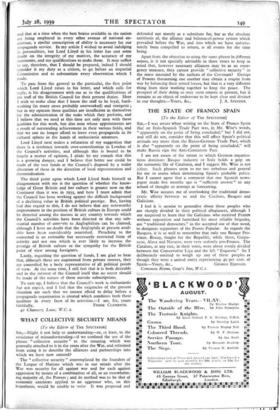THE STATE OF FRANCO SPAIN [To the Editor of THE
SPECTATOR]
Sta,—I was aware when writing on the State of Franco Spain that an Italo-Spanish Trade Pact was, in Mr. Wise's words, "apparently on the point of being concluded," but I did not, and still do not, consider that this will affect Spain's political attitude any more than the Russo-German Trade Pact, which is also "apparently on the point of being concluded," will make Russia sign the Anti-Comintern Pact.
I am not aware of the extent to which German organisa- tions dominate Basque industry or Italy holds a grip on the economic life of Catalonia, and I suggest Mr. Wise is not either. Such phrases seem to me too nebulous and general for me to assess when determining Spain's probable policy. But I cannot agree that a comment that one Spanish news- paper made five months ago is "sufficient answer" to any school of thought or attempt at forecasting.
Mr. Wise accuses me of overlooking the traditional demo- cratic affinity between us and the Catalans, Basques and Galicians.
I feel it is unwise to generalise about these peoples who are sharply divided in their political allegiances, although I am surprised to learn that the Galicians who received Franco without opposition and furnished his most reliable brigades, are "traditional democrats," in the accepted use of that word, to designate supporters of the Frente Popular. As regards the Basques, it is as well to remember that only one Basque Pro- vince, Biscay, fought for the Republic, while three, Guipu- zcoa, Alava and Navarre, were very ardently pro-Franco. The Catalans at any rate, in their votes, were about evenly divided between the Conservative Liga and the left " Esquerra." So I deliberately omitted to weigh up any of these peoples as though they were a united entity representing 40 per cent. of Spain.—Yours, &c., GEORGE EDINGER. ommon Room, Gray's Inn, W.C.r.








































 Previous page
Previous page